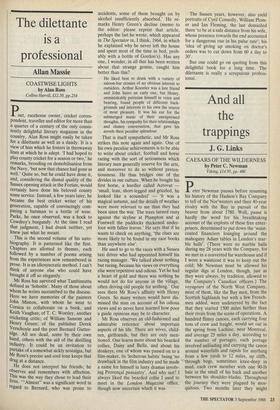The dilettante is a professional
Allan Massie
COASTWISE LIGHTS by Alan Ross
Collins Harvill, £12.50, pp.254
Poet, racehorse owner, cricket corres- pondent, traveller and editor for more than a quarter of a century of the only consis- tently delightful literary magazine in the country, Alan Ross might easily be taken for a dilettante as well as a dandy. It is a view of him which he fosters in throwaway lines at which he is adept. 'I had hoped to play county cricket for a season or two,' he remarks, brooding on demobilisation from the Navy, 'but now that chance had gone as well.' Quite so, but he could have done it, and, considering the dismal quality of the Sussex opening attack in the Forties, would certainly have done his beloved county some service. Instead, a few years later, he became the best cricket writer of his generation, capable of convincingly com- paring a batsman to a bottle of wine. Parks, he once observed, was a hock to Cowdrey's burgundy. At the time I read that judgment, I had drunk neither, yet knew just what he meant.
This is the second volume of his auto- biography. It is patterned like the first. Chapters are allotted to themes, each followed by a number of poems arising from the experiences now remembered in prose. It is an idiosyncratic method. I can't think of anyone else who could have brought it off so elegantly.
Mr Ross has survived what Tambimuttu defined as `Sohoitis'. Many of those about whom he writes succumbed to the disease. Here we have memories of the painters John Minton, with whom he went to Corsica to collaborate on a book, and Keith Vaughan; of T. C. Worsley, another cricketing critic; of William Sansom and Henry Green; of the publisher Derek yerschoyle and the poet Bernard Gutter- idge. All are dead, some by their own hand, others with the aid of the distilling industry. It could be an invitation to partake of a somewhat sickly nostalgia, but Mr Ross's precise and cool tone keeps that drug at a distance.
He does not interpret his friends; he observes and remembers with affection. This was the way they chose to lead their lives. "'Almost" was a significant word in regard to Bernard, who was prone to accidents, some of them brought on by alcohol insufficiently absorbed.' He re- marks Henry Green's decline (memo to the editor: please reprint that article, perhaps the last he wrote, which appeared in The Spectator in, I think, 1964, in which he explained why he never left the house and spent most of the time in bed, prob- ably with a bottle of Gordon's). Has any one, I wonder, in all that has been written about that strange genius, caught him better than this?
He liked best to drink with a variety of saloon-bar cronies of no obvious interest to outsiders. Arthur Koestler was a late friend and John Sutro an early one, but Henry, unmistakably patrician himself in voice and bearing, found people of different back- grounds and interests to his own the source of most pleasure. It was his ear for the submerged music of their unexpressed thoughts, his sympathy for their relationships and clumsy conversation, that gave his novels their peculiar splendour.
That is itself sympathetic, and Mr Ross strikes this note again and again. One of his own peculiar achievements is to be able to write about cricket, football and horse racing with the sort of seriousness which literary men generally reserve for the arts, and moreover to do so without preten- tiousness. He thus bridges one of the divides in our culture. When he bought his first horse, a hurdler called Acrovat 'small, lean, short-legged and grizzled, he looked like a scoundrel' — it was a magical autumn, and the details of weather were more relevant to me than they had been since the war. The trees turned rusty against the skyline at Plumpton and at Fontwell the paddocks thickened under- foot with fallen leaves.' He says that if he wants to check on anything, 'the clues are more likely to be found in my race books than anywhere else'.
He used to go to the races with a Sussex taxi driver who had appointed himself his racing manager. 'We talked about nothing but racing, because his views on everything else were'repetitive and odious. Yet he had a heart of gold and there was nothing he would not do for anyone in the village, often driving old people for nothing.' One sees there Mr Ross's affinity with Henry Green. So many writers would have dis- missed the man on account of his odious views and so never have learned how poor a guide opinions may be to character.
Mr Ross observes an old-fashioned and admirable reticence about important aspects of his life. There are wives, child- ren, girlfriends, but they are only men- tioned. One learns more about his bearded collies, Daisy and Bella, and about his donkeys, one of whom was passed on to a film-maker, its 'lecherous habits' being `no drawback in the film industry and he made a name for himself in lusty dramas involv- ing Provençal peasantry'. And why not? I always liked the bearded collie I used to meet in the London Magazine office, though now uncertain which it was. The Sussex years, however, also yield portraits of Cyril Connolly, William Plom- er and Ian Fleming, the last domiciled there `to be at a safe distance from his wife, whose presence towards the end accounted for a dangerous rise in his pulse rate'; his `idea of giving up smoking on doctor's orders was to cut down from 60 a day to 30'.
But one could go on quoting from this delightful book for a long time. The dilettante is really a scrupulous profess- ional.










































 Previous page
Previous page